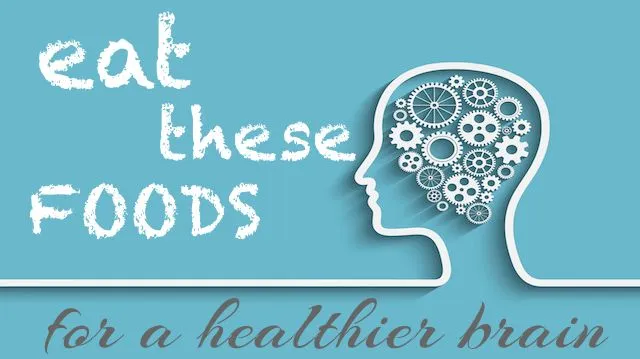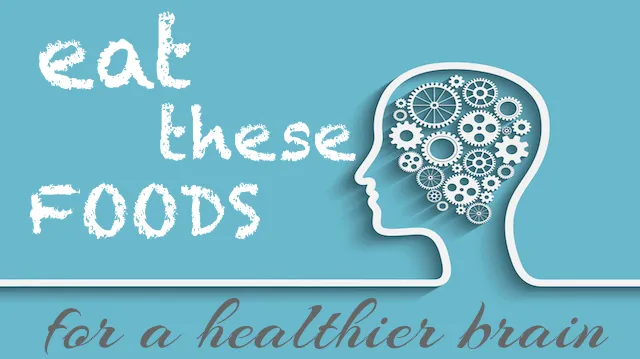
- Share on Facebook28
- Share on Pinterest
- Share on Twitter
Growing up, we were taught that in order to ace a test or do well in school, we should start our day with a bowl of Wheaties and a glass of OJ or milk. Thankfully, we now know that those foods do not promote a healthy brain but instead contribute to inflammation.
Gluten, refined grains, conventional dairy and refined sugar (including processed juice) all trigger chemical reactions in the brain that can lead to poor brain health, but nature has an array of foods that we can use to focus better and even age better too.
When learning to eat for our brain, we must focus on four key areas: greens and vegetables, protein, healthy fats, and the most nutrient-dense, fiber-rich carbohydrates from whole foods. These promote healthy neurotransmitters, which will assist with focus, mood and the production of hormones that assist with brain function.
Let’s look at some of the best foods to support overall brain health.
Leafy greens
Greens contain folate, vitamin A, vitamin C, B vitamins and amino acids that improve brain health. They also combat inflammation, ward off sugar cravings and even relieve stress. Spinach, kale, chard, arugula, romaine, collards and dandelion greens are among the most nutritious, but any fresh green vegetable is great for your body. Even wild lettuces and herbs count, so be sure to rotate your greens and include them in your diet as much as possible.
Avocados
This nutrient-rich fruit is beneficial for the brain because it’s a great source of vitamin B5 and vitamin B6. It is also one of the best sources of monounsaturated fats and vitamin E, which protect the brain, blood and heart. While they are not high in protein, avocados do contain more protein than almost any other fruit, with four grams per avocado. They are also a great source of magnesium, tryptophan and potassium, which reduce blood sugar and blood pressure levels associated with stress and anxiety.
Raw cashews
These healthy little nuts are powerful at reducing stress and helping your brain focus. They’re a fantastic source of magnesium, monounsaturated fats, iron, B vitamins, and they are easy to digest. Many people who don’t tolerate tree nuts can tolerate cashews because they’re a member of the drupe family, which means they are actually a fruit.
Coconut
Coconut’s healthy fats and amino acids make it excellent for brain health. It’s also a fantastic source of saturated fats, which are required for optimal cholesterol levels in the body. Many people don’t know that our bodies cannot produce hormones without cholesterol. We need healthy anti-inflammatory sources of saturated fats from foods like coconut, red palm oil, and raw or dark cacao. (Cashews also contain a bit of saturated fat too.) Coconut is especially great for the brain since it improves the body’s production of ketones, used for focus and to prevent memory loss. It may even prevent and treat epilepsy, Alzheimer’s disease and age-related cognitive diseases of all kinds.
Wild fish
Wild salmon is one of the best sources of the amino acids that are required for optimal brain health, along with omega-3 fatty acids. Choose wild Alaskan salmon, not Pacific salmon or farmed salmon, which are loaded with pesticides, hormones and unhealthy omega-6 fats. Other wild fish that are great for the brain include wild halibut and wild rainbow trout, also high in omega-3s and B vitamins. Wild fish such as these are one of the key items in the well-known Mediterranean diet, which is the diet most associated with brain health and longevity.
Hemp seeds (and hemp protein)
Hemp seeds and hemp protein are both excellent options if you’re a vegan and want an alternative to fish for omega-3s and protein. Hemp seeds contain all essential amino acids, omega-3s, iron, magnesium and B vitamins. The whole seeds are a good source of fat, and cold-milled hemp protein powder is high in fiber and protein.
Sweet potatoes
Sweet potatoes may be one of the healthiest carbohydrates you can eat for brain health, as well as overall health. The body needs some carbohydrates from produce for optimal brain and hormone function, so these spuds are a great option! Sweet potatoes contain a rich amount of B vitamins, magnesium, potassium, and vitamin A. They are also an excellent source of tryptophan, an amino acid that reduces stress and obsessive thoughts. Lastly, sweet potatoes are a wonderful source of fiber, and they’re a great alternative to grains if you consume a grain-free diet.
Gluten-free oats
If you’re going to eat grains, gluten-free oats are a fantastic brain food. They are well studied for their ability to assist with overall health. Gluten-free oats are more beneficial than regular oats since they are processed in a facility that does not produce gluten-containing grains. Since gluten can interfere with optimal brain health, it’s especially important to choose gluten-free grain options. Oats are a fantastic source of B vitamins, especially vitamin B5, B3 and B6, which are all required for proper brain function. Oats are also a great source of iron, magnesium, potassium, calcium and fiber. They even provide seven grams of protein per one-third of a cup!
Just one caveat: be sure to soak your oats for optimal digestion and nutrient assimilation. Soaking them in yogurt the night before reduces the starch intake and removes some of the enzyme inhibitors naturally found in grains. The probiotics in the yogurt essentially use the oats for food and in the process, they become easier to digest. After soaking raw oats overnight, you have a raw, cultured food that can do wonders for your brain and body. If you are dairy-free, choose a no-sugar-added yogurt alternative.
Quinoa
Quinoa is another option if you don’t like or can’t have oats. Quinoa may contain less protein, fiber and iron per serving than oats, but it is a complete protein so it’s a fantastic source of amino acids. Technically a seed, quinoa is a great option for easy digestion. You can soak it, sprout it, or cook it. With a nutty flavor and a texture that is similar to short-grain rice, quinoa contains B vitamins and magnesium that assist with brain function and mood balance.
Broccoli
This veggie might seem boring, but it is packed with nutrition! Broccoli contains vitamin B6, which is needed by the brain for optimal focus and stress prevention. It’s also high in calcium, protein and vitamin C, which all assist with reducing stress and improving overall mood. Lastly, broccoli contains a high amount of chlorophyll to reduce inflammation. If you don’t tolerate raw broccoli, then you’ll want to steam it for easier digestion.
Pumpkin seeds
Raw pumpkin seeds are another fantastic nutrient-dense food to add to your plate. Rich in tryptophan, protein, omega-3 fatty acids, iron, B vitamins and potassium, these little seeds are incredible mood boosters! Pumpkin seeds aid in focus, memory, relaxation and their high chlorophyll content can reduce inflammation.
Raw almonds
These well-loved nuts are a great source of protein, with seven grams per quarter of a cup. Protein is required for focus, prevention of depression and anxiety, blood sugar regulation and even fatigue prevention. Almonds contain vitamin E, which reduces inflammation in the brain associated with aging. They’re a great source of magnesium too, which reduces stress and balances blood sugar levels.
Pumpkin
Pumpkin is similar to sweet potatoes in its benefits, but also comes with a few other benefits. Pumpkin is lower in sugar and overall carbs than sweet potatoes, making it a better option for those watching their carbohydrate intake or those with diabetes. It’s also higher in iron and fiber per serving. Iron is required for a healthy mood and metabolism, while fiber assists with healthy blood sugar levels, improving focus.
Berries
All berries fight inflammation, improve memory, assist with heart health and mood, reduce anxiety and aid in digestion. Best of all, berries are one of the top foods for improving gut health as they feed good bacteria in the digestive tract, creating a healthy microbiome. Their high antioxidant content helps neutralize free radicals in the body, preventing the aging and disease that free radicals may cause. Try blueberries, whole cranberries (dried tend to have added sugar), strawberries, raspberries, acai, goji, maqui and camu camu berries.
Dark chocolate and raw cacao
 One of the best brain foods of all time is perhaps dark chocolate and raw cacao. This food is a fantastic source of iron, magnesium, zinc, B vitamins and natural chemicals that release dopamine and serotonin, supporting a healthy mood. This superfood is also an excellent way to reduce inflammation in the brain and has been shown to improve longevity, memory and focus, and assist with overall heart health — it’s even great for blood sugar and diabetes! Just be sure you choose raw cacao or dark chocolate with 90 percent cacao content to avoid the sugar in regular chocolate.
One of the best brain foods of all time is perhaps dark chocolate and raw cacao. This food is a fantastic source of iron, magnesium, zinc, B vitamins and natural chemicals that release dopamine and serotonin, supporting a healthy mood. This superfood is also an excellent way to reduce inflammation in the brain and has been shown to improve longevity, memory and focus, and assist with overall heart health — it’s even great for blood sugar and diabetes! Just be sure you choose raw cacao or dark chocolate with 90 percent cacao content to avoid the sugar in regular chocolate.
There are many other foods that are incredible for your brain, of course, but if you’re looking for a great place to start, be sure to give these a try. Do you eat any of these foods and, if so, what’s your favorite way to enjoy them?
—Heather McClees
Heather McClees is a professional health journalist and Certified Holistic Nutritionist from South Carolina.She received her B.S. Degree in Nutrition Science and Dietetics, and is most passionate about helping others discover the gift of of holistic health, showing others how to create healthy recipes based on their favorite foods, physical fitness and yoga, and creative writing.
Sources:
http://onlinelibrary.wiley.com/doi/10.1002/ana.23593/abstract
http://www.ncbi.nlm.nih.gov/pmc/articles/PMC2805706
- Share on Facebook28
- Share on Pinterest
- Share on Twitter

